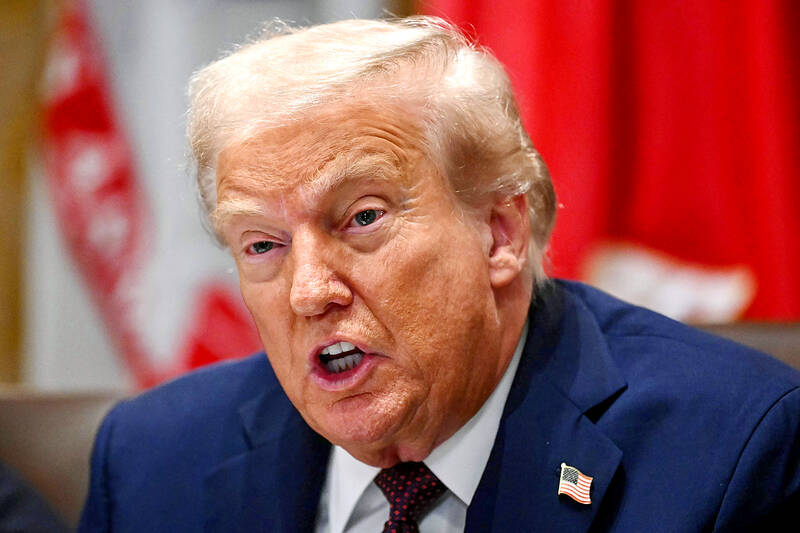US President Donald Trump’s administration on Wednesday asked the US Supreme Court for an expedited ruling preserving the tariffs that have roiled global markets, saying a lower court ruling against it has already damaged trade negotiations.
US Solicitor General John Sauer urged the court in a filing to “expedite resolution of this case to the maximum extent feasible, given the enormous importance of quickly confirming the full legal standing of the President’s tariffs.”
The petition comes after a 7-4 ruling by the US Court of Appeals for the Federal Circuit, which found that Trump exceeded his authority in tapping emergency economic powers to impose wide-ranging duties.

Photo: AFP
However, the judges allowed the levies to stay in place through the middle of next month, giving Trump time to take the fight to the US Supreme Court.
Since returning to the presidency, Trump has invoked the International Emergency Economic Powers Act to impose “reciprocal” tariffs on almost all US trading partners, with a 10 percent baseline level and higher rates for dozens of economies, including the EU and Japan.
Trump tapped similar powers to slap separate tariffs on Mexico, Canada and China over what he said was the flow of deadly drugs into the US.
The appeals court ruling also cast doubt over deals Trump has struck with key trading partners such as the EU, raising the question of what would happen to the billions of US dollars collected by the US since the tariffs were put in place — if the conservative-majority Supreme Court does not side with him.
Several legal challenges have been filed against the tariffs. If they are ultimately ruled illegal, companies could potentially seek reimbursements.
On Tuesday, Trump told reporters that “if you took away tariffs, we could end up being a third-world country.”
In a declaration filed with the petition, US Secretary of the Treasury Scott Bessent said that the appellate court’s decision “gravely undermines the President’s ability to conduct real-world diplomacy and his ability to protect the national security and economy of the United States.”
“World leaders are questioning the President’s authority to impose tariffs, walking away from or delaying negotiations,” he said, adding that the ruling had stripped the administration of “substantial negotiating leverage.”
He added that delaying a final ruling until June next year could result in a scenario where “US$750 billion-US$1 trillion in tariffs have already been collected, and unwinding them could cause significant disruption.”
The solicitor general requested oral arguments by early November.

Taiwan Semiconductor Manufacturing Co (TSMC, 台積電) secured a record 70.2 percent share of the global foundry business in the second quarter, up from 67.6 percent the previous quarter, and continued widening its lead over second-placed Samsung Electronics Co, TrendForce Corp (集邦科技) said on Monday. TSMC posted US$30.24 billion in sales in the April-to-June period, up 18.5 percent from the previous quarter, driven by major smartphone customers entering their ramp-up cycle and robust demand for artificial intelligence chips, laptops and PCs, which boosted wafer shipments and average selling prices, TrendForce said in a report. Samsung’s sales also grew in the second quarter, up

On Tuesday, US President Donald Trump weighed in on a pressing national issue: The rebranding of a restaurant chain. Last week, Cracker Barrel, a Tennessee company whose nationwide locations lean heavily on a cozy, old-timey aesthetic — “rocking chairs on the porch, a warm fire in the hearth, peg games on the table” — announced it was updating its logo. Uncle Herschel, the man who once appeared next to the letters with a barrel, was gone. It sparked ire on the right, with Donald Trump Jr leading a charge against the rebranding: “WTF is wrong with Cracker Barrel?!” Later, Trump Sr weighed

HEADWINDS: Upfront investment is unavoidable in the merger, but cost savings would materialize over time, TS Financial Holding Co president Welch Lin said TS Financial Holding Co (台新新光金控) said it would take about two years before the benefits of its merger with Shin Kong Financial Holding Co (新光金控) become evident, as the group prioritizes the consolidation of its major subsidiaries. “The group’s priority is to complete the consolidation of different subsidiaries,” Welch Lin (林維俊), president of the nation’s fourth-largest financial conglomerate by assets, told reporters during its first earnings briefing since the merger took effect on July 24. The asset management units are scheduled to merge in November, followed by life insurance in January next year and securities operations in April, Lin said. Banking integration,

LIMITED IMPACT: Investor confidence was likely sustained by its relatively small exposure to the Chinese market, as only less advanced chips are made in Nanjing Taiwan Semiconductor Manufacturing Co (TSMC, 台積電) saw its stock price close steady yesterday in a sign that the loss of the validated end user (VEU) status for its Nanjing, China, fab should have a mild impact on the world’s biggest contract chipmaker financially and technologically. Media reports about the waiver loss sent TSMC down 1.29 percent during the early trading session yesterday, but the stock soon regained strength and ended at NT$1,160, unchanged from Tuesday. Investors’ confidence in TSMC was likely built on its relatively small exposure to the Chinese market, as Chinese customers contributed about 9 percent to TSMC’s revenue last